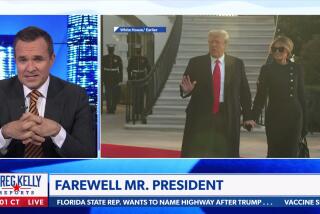KMEX Won’t Broadcast Ads for Hard Liquor
- Share via
Ray Chavira discovered that he won a small victory this week when Los Angeles Spanish-language television station KMEX (Channel 34) wrote to inform the anti-alcoholism crusader that it had ceased airing hard-liquor commercials.
“I would like to inform you (that) we will no longer accept advertising for hard-liquor products, which would be in conformity with the policies most broadcasters are presently implementing throughout the United States,” wrote Daniel Villanueva, KMEX’s general manager.
Chavira and the local community groups that support the national efforts of the Center for Science in the Public Interest, a Washington-based consumer advocacy organization, against hard-liquor commercials on Spanish-language television were heartened by KMEX’s response.
“We are very happy and thankful that KMEX recognizes their responsibility to the community because they have always done so in the past,” said Ramona Fletcher, a lobbyist for California’s 3,500 local Parent-Teachers Assn. chapters.
Fletcher said the five PTA districts in Los Angeles County now plan to train their sights on KVEA (Channel 52)--a Glendale station that is part of the five-station Telemundo Network. Two of the five Telemundo stations have aired Remy Martin Cognac, Bailey’s Irish Creme and Cutty Sark Scotch commercials.
“We will begin writing letters and contacting people at Telemundo and KVEA,” Fletcher said. “We do believe they are out of line with the rest of (English-language) broadcasters” who have voluntarily refrained from airing hard-liquor commercials since 1936.
The response of KMEX, a station principally owned by Hallmark Cards Corp., came several weeks after the Center for Science in the Public Interest threatened to picket the station. The picketing threat eventually moved KMEX management to meet with Chavira.
“The Hispanic community is already suffering more than its fair share of problems from boozing,” said Chavira, citing figures that show that 47% of all drivers arrested for drunk driving in Los Angeles County are Latino.
More serious, he added, would be the precedent set. “If the small, Hispanic stations start (airing liquor ads),” asked Chavira, “what will stop the big stations from doing it?”
Assistant station manager Leopoldo Ramos insists that the policy review that culminated in the decision to drop advertisements for Remy Martin Cognac had begun before pressure was applied. Still, the protest threats had “influenced” Hallmark’s policy decision, Ramos said.
But Frank Cruz, KVEA vice president and general manager, insists that his station has the legal right to carry liquor ads--and is considering airing more of such commercials.
“It’s a drop in the bucket compared to what the big beer companies spend on the major networks,” he said. “Next thing you know, they’ll be telling us not to carry automobile advertisements because cars kill people.”
A report released in May by the Center for Science in the Public Interest estimates that about $700 million is spent each year to buy air time for beer, wine and wine cooler television commercials.
Although the money spent to advertise hard liquor on television is negligible compared with beer and wine advertising expenditures, liquor advertising nevertheless represents a “trial balloon” sent up by a frustrated minority of distilled spirits producers, said Max Kerstein, publisher of the Beverage Bulletin, a Beverly Hills-based trade publication.
“It is now getting to the point where (a few distillers) are testing the waters to see whether this can become an acceptable practice” that might reverse the declining popularity of hard-liquor products, he said.
Chavira claims that the local coalition that he represents is not unfairly focusing its wrath on KVEA. “We can’t go back to the days of Prohibition,” he acknowledged. “But we can reduce consumption by reducing availability and visibility” of alcoholic beverages.
Center spokesperson Karen Lieberman agreed, adding that her organization hopes to persuade television broadcasters to provide more warnings on the health risks associated with alcohol and to persuade the government to sharply boost federal excise taxes on alcoholic beverages.
Lobbyists for the hard-liquor industry have replied to the center’s ongoing efforts by arguing that there is no scientific evidence showing that television ads increase alcohol consumption.
More to Read
Sign up for Essential California
The most important California stories and recommendations in your inbox every morning.
You may occasionally receive promotional content from the Los Angeles Times.













